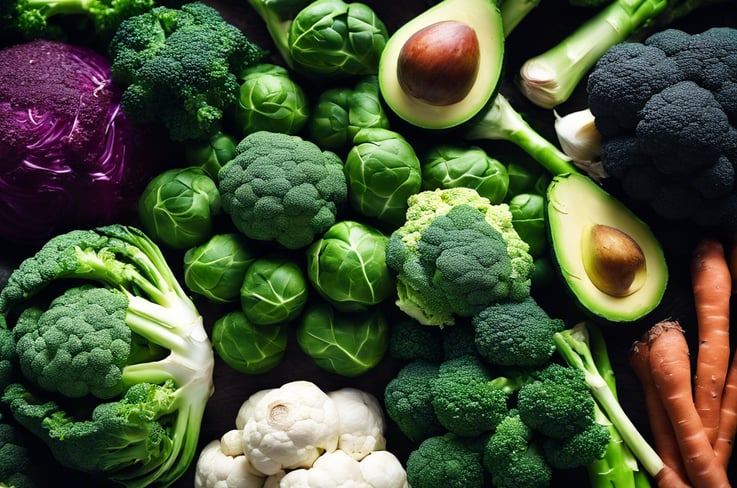Glutathione: Powerful Antioxidant Against Free Radicals
Discover how glutathione functions as a potent antioxidant, neutralizing free radicals and reducing oxidative stress. Learn more about its vital role in preserving cellular integrity and preventing diseases.
OPTIMAL NUTRITION & METABOLISM
7 min read


What is Glutathione?
Glutathione, often hailed as the 'master antioxidant,' is a remarkable molecule with profound importance in the human body. Chemically, glutathione is a tripeptide, a molecule composed of three amino acids: glutamine, cysteine, and glycine. This unique combination renders glutathione a pivotal role in maintaining cellular health and overall wellbeing.
At the cellular level, glutathione functions as a potent antioxidant. Antioxidants are crucial because they neutralize free radicals — unstable molecules that can cause oxidative stress, leading to cellular damage and contributing to various diseases. By mitigating oxidative stress, glutathione thereby helps in preserving the integrity of cells and tissues.
Beyond its antioxidant properties, glutathione is integral in detoxifying harmful substances. It binds to toxins, heavy metals, and other pollutants, facilitating their excretion from the body. This detoxification process is essential for protecting organs such as the liver, which encounters a high load of toxins.
The importance of glutathione extends to various biochemical and physiological functions. For instance, it plays a role in DNA synthesis and repair, protein synthesis, and supporting immune function. Glutathione also contributes to the regeneration of other antioxidants, such as vitamins C and E, enhancing the body’s overall antioxidant defense system.
Moreover, glutathione's role in cellular functions underscores its significance in maintaining health. Adequate levels of glutathione are associated with reduced incidence of chronic illnesses, improved physical performance, and a slower aging process. Conversely, diminished glutathione levels are linked to numerous health issues, including neurodegenerative diseases, cardiovascular disorders, and compromised immune defenses.
In essence, the multifaceted functions of glutathione render it a cornerstone in the body’s defense mechanisms. By preserving cellular health, aiding in detoxification, and supporting numerous metabolic processes, glutathione stands as a critical determinant of overall health and longevity.
Where is Glutathione Found in Nature?
Glutathione, often dubbed as nature's master antioxidant, is omnipresent in the cellular makeup of both animal and plant life. Its extensive prevalence is a testament to its integral role in maintaining cellular health and defending against oxidative stress. Within the realm of animal sources, glutathione is naturally synthesized in every cell, with higher concentrations observed in the liver, kidneys, and lungs, where it performs critical detoxification functions.
From a botanical perspective, certain foods are especially rich in glutathione and its precursors, thus bolstering the body's ability to synthesize this pivotal antioxidant. Leafy greens like spinach and cruciferous vegetables such as broccoli and Brussels sprouts are notable plant sources. Additionally, avocados, asparagus, and garlic also contribute significantly to dietary glutathione. These foods not only supply glutathione directly but are also rich in the essential amino acids required for its synthesis.
To optimize glutathione levels, incorporating these nutrient-dense foods into one's diet is highly beneficial. For instance, the sulfur-containing compounds in garlic and onions have been shown to enhance the body’s glutathione production. The inclusion of fruits such as oranges, strawberries, and papayas, which are high in vitamin C, can also play a vital role, as this vitamin is known to help regenerate glutathione within cells.
Lifestyle factors undeniably influence glutathione levels as well. Regular physical activity can boost glutathione synthesis, while adequate sleep and stress management further support its maintenance. Conversely, exposure to pollutants, overconsumption of alcohol, and chronic stress can deplete glutathione reserves, emphasizing the need for balanced, health-conscious living.
In summary, naturally occurring glutathione is found widespread across the animal and plant kingdoms, with numerous dietary sources contributing to its availability. By prioritizing a diet rich in glutathione-enhancing foods and adopting a healthy lifestyle, one can help maintain optimal levels of this crucial antioxidant, thereby safeguarding against various health challenges.
Health Benefits of Glutathione
Glutathione is a tripeptide composed of three amino acids – cysteine, glycine, and glutamic acid – and plays a pivotal role in maintaining overall health, thanks to its potent antioxidant properties. One of the primary health benefits of glutathione is its ability to bolster the immune system. By neutralizing free radicals and reactive oxygen species, glutathione minimizes oxidative stress, which can otherwise impair immune function and make the body more susceptible to infections and diseases.
The liver, a critical organ for detoxification, greatly relies on adequate levels of glutathione. It supports liver function by facilitating the neutralization and elimination of toxins, heavy metals, and other harmful substances. Enhanced detoxification capability helps in preventing liver diseases and promoting overall liver health. Additionally, glutathione is essential for cellular health; it aids in the repair and regeneration of cells, thereby improving tissue integrity and function throughout the body.
Emerging research also highlights glutathione's protective effects against various chronic diseases. Its role in combating oxidative stress is linked to reduced risks of conditions such as cancer and heart disease. For individuals with neurodegenerative disorders like Alzheimer’s and Parkinson’s disease, glutathione supplementation holds promise due to its neuroprotective properties. These effects are attributed to its ability to counteract neuronal damage and reduce inflammatory responses in the brain.
Recent studies have further explored the supplementary use of glutathione. Preliminary findings suggest that oral and intravenous glutathione may improve symptoms and markers in conditions linked to oxidative stress and inflammation. These include diabetes, chronic fatigue syndrome, and even certain skin disorders, making glutathione a widely researched candidate for future therapeutic applications.
Indeed, glutathione stands out as a cornerstone in promoting health and preventing disease. Its wide-ranging benefits underscore the importance of maintaining adequate levels of this vital antioxidant through diet, lifestyle, and potentially supplementation under professional guidance.
Potential Side Effects of Glutathione
While glutathione is lauded for its remarkable antioxidative properties and myriad health benefits, it is crucial to acknowledge the potential side effects that can arise from excessive supplementation or improper use. Primarily, the body synthesizes glutathione naturally, but additional intake through external supplements can sometimes lead to adverse reactions.
One commonly reported side effect of glutathione supplementation is abdominal discomfort. This discomfort often manifests as cramps or bloating, which can be particularly distressing for individuals with sensitive digestive systems. Such gastrointestinal issues occur when the body struggles to process the increased levels of this antioxidant.
Another potential drawback includes allergic reactions. Although rare, glutathione can cause hypersensitivity in some users. These allergic reactions may present as skin rashes, itching, swelling, or respiratory difficulties. It is critical to discontinue use immediately and consult a healthcare provider if any of these symptoms occur.
Additionally, overuse of glutathione supplements could disrupt natural synthesis in the body. The body's regulation mechanisms may reduce or cease endogenous production when relying too heavily on exogenous sources. Therefore, maintaining the balance through appropriate dosing is paramount to benefiting from this powerful antioxidant without triggering adverse effects.
Given these potential side effects, professional medical supervision is indispensable when considering glutathione supplementation. A healthcare provider can tailor the dosage to the individual's needs, ensuring an optimal balance that maximizes benefits while minimizing risks. Correct dosage adjustments can prevent the body from experiencing undue strain and help mitigate side effects associated with glutathione.
In conclusion, while glutathione is a powerful antioxidant that provides immense health benefits, responsible usage is crucial. Consulting with healthcare professionals and adhering to recommended dosages can significantly reduce the risk of adverse effects, ensuring a safe and beneficial supplementation experience.
How to Supplement Glutathione
Supplementing glutathione can be approached through several methods, each with its unique characteristics, efficacy, and bioavailability. Understanding these options helps ensure optimal use and absorption, maximizing the potential benefits of this powerful antioxidant.
Oral Supplements
Oral glutathione supplements are widely available, often in pill or capsule form. They are convenient and accessible, making them a popular choice. However, the bioavailability of oral supplements can be a concern as stomach acids may degrade glutathione during digestion, limiting absorption. To counter this, some formulations include liposomal encapsulation, which enhances the stability and uptake of glutathione in the digestive tract.
Intravenous (IV) Glutathione
Intravenous administration is another method that directly delivers glutathione into the bloodstream. This approach bypasses the digestive system entirely, ensuring 100% bioavailability. IV glutathione is often used in clinical settings for its rapid and high-dose delivery, offering immediate effects. While highly effective, this method requires a healthcare professional for administration and may not be practical for regular use.
Topical glutathione products, such as creams and serums, offer another route of supplementation. These products are applied directly to the skin, targeting areas prone to oxidative stress and damage. The bioavailability of topical glutathione can vary, depending on the formulation and the skin's ability to absorb the antioxidant. Regular use of high-quality topical glutathione can promote skin health and reduce signs of aging.
Recommended Dosages and Choosing Quality Products
The recommended dosage of glutathione supplements can vary based on individual needs and the chosen method of supplementation. Oral supplements typically range from 250 to 1,000 mg per day, while IV doses are higher and tailored to specific conditions under medical supervision. Topical applications depend on the product's concentration and intended use.
When selecting glutathione supplements, prioritizing quality is crucial. Look for products from reputable manufacturers that provide third-party testing to ensure purity and potency. Liposomal formulations are recommended for oral supplements to enhance bioavailability, and for topical products, check for complementary ingredients that aid in absorption
Current Research on Glutathione
Ongoing research continues to unveil new insights into the multifaceted roles of glutathione, a potent antioxidant critical for maintaining cellular health. Recent studies have highlighted glutathione's extensive implications across various health domains, underlining its potential in both preventive and therapeutic contexts.
Several clinical trials have demonstrated glutathione's efficacy in the management of oxidative stress-related conditions. For instance, a significant body of research suggests that glutathione supplementation may beneficially impact neurodegenerative diseases such as Parkinson's and Alzheimer's. One study showed that patients with Parkinson's disease exhibited reduced oxidative damage markers when administered glutathione, pointing to its neuroprotective properties.
Research is also expanding into the realm of oncological sciences, where glutathione's role in cancer treatment is being interrogated. Emerging evidence suggests that modulating intracellular glutathione levels could influence the sensitivity of cancer cells to chemotherapy, potentially enhancing treatment outcomes. Experimental frameworks involving in vitro and in vivo models are currently being pursued to validate these preliminary findings.
Furthermore, glutathione's impact on metabolic health is an area of burgeoning interest. Recent experimental studies illustrate its potential benefit in ameliorating insulin resistance and reducing the risk of type 2 diabetes. Clinical trials have begun to explore whether glutathione supplementation can improve clinical markers in metabolic syndrome patients, with promising initial results.
Looking ahead, future research directions are increasingly focusing on the mechanistic pathways through which glutathione exerts its effects. The exploration of glutathione transport systems, regulation of glutathione synthesis, and identification of genetic variants influencing glutathione metabolism are key emerging trends. These efforts aim to refine therapeutic strategies and develop precision medicine approaches leveraging glutathione's unique properties.
In summary, the continuous advancements in glutathione research illuminate its vast therapeutic potential. The pursuit of detailed understanding through rigorous scientific investigation remains crucial, with the promise of translating these discoveries into substantive health benefits.
Always seek the advice of a qualified professional before implementing any new practices or treatments discussed on this article. The content on this website is intended for informational purposes only and should not be considered professional advice.




Optimize Your Health with Cutting-Edge Biohacking Research and Tech Wearable
© 2024. All rights reserved.
The content on this website is intended for informational purposes only and should not be considered as professional advice. It is not a substitute for personalized medical, nutritional, or fitness guidance. Please do not make any changes to your lifestyle, diet, or exercise routine based on the information provided here without first consulting with your healthcare provider. Always seek the advice of a qualified professional before implementing any new practices or treatments discussed on this site. Your health and safety are our top priority.


